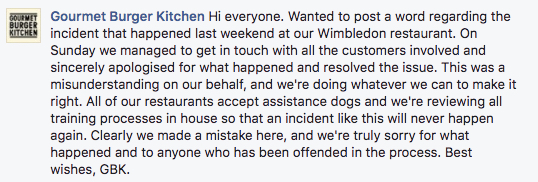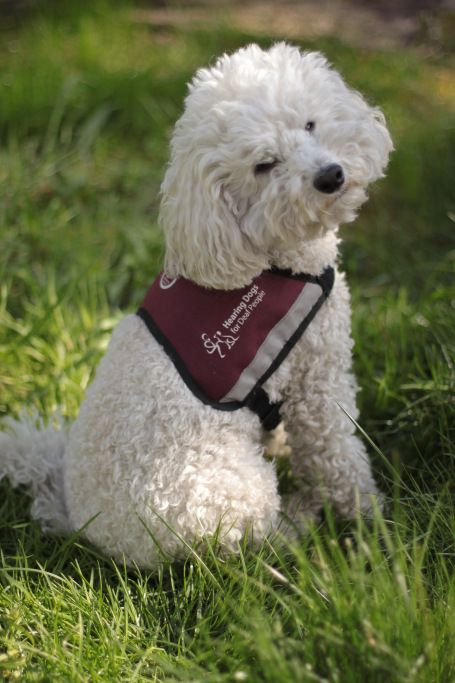What All UK Businesses Can Learn From The Gourmet Burger Kitchen Scandal
On the 19th of August 2017, a deaf man was kicked out of the Gourmet Burger Kitchen in Wimbledon, UK. His only crime was entering the restaurant with his Hearing Dog. A dog with its Hearing Dog coat, lead and ID Card prominently displayed.
The story has created an uproar and exploded on social media. Our deaf community is outraged, calling the incident “a blatant act of discrimination”. Others, mostly hearing people, scoffed and described the incident as “a misunderstanding”.
Whether you view it as discrimination or a simple mistake, it’s clear that UK businesses can learn a lot from this occurrence and avoid making a right dog’s breakfast of access rights and receiving similar bad press.
The incident at the Wimbledon branch of Gourmet Burger Kitchen
In case you’ve been away on holiday or immersed in your work or studies and have missed the commotion, let me take you through what happened.
A man and woman enter a Gourmet Burger Kitchen restaurant. No, this is not the start of a joke. The man has a clearly identified Hearing Dog with him as he is deaf. The couple sits down, ready for a delicious meal. A GBK staff member comes over, presumably to take their order. No such luck.
The man and his wife are asked to leave the restaurant because dogs are not allowed in their “up class” establishment. Despite the couple’s protests and their legal right to have their Hearing Dog with them, they are kicked out.
The next day, after all, publicity hell broke loose, the couple were contacted and received a sincere apology. The deaf community was also issued an apology, posted on the widely popular Facebook page, Hearing Dogs for Deaf People.
It’s nice to get an apology. However, it’s too little, too late. I know how it feels to be told you’re banned just because I have a disability. It’s heart breaking. These “mistakes” should not be happening. Which is why I thought we could all learn from GBK’s blunder, especially restaurants.
5 things to learn from deaf discrimination
1. What does the law say?
The Equality Act has been in place since 2010. We have a legal right to access all public places with an assistance dog. Companies or organisations who ignore this legislation can be prosecuted.
Discrimination occurs when a person is treated differently and less favourably because of certain characteristics, this includes:
- Excluding people from your business, e.g. not allowing them to eat at your restaurant.
- Excluding people from benefits, e.g. not selling a deaf person a car because you believe they shouldn’t drive.
- Allowing people access to services, but with inferior terms, for example seating a deaf customer in the noisiest corner of the restaurant because ‘they can’t hear anyway’.
- Verbally or physically mistreating people, e.g. insulting them.
2. Staff training
Clearly, more emphasis should be placed on preventative discrimination training. Many businesses tend to focus on discrimination and harassment in the workplace, but forget that customers should receive similar treatment.
Employees and managers working with customers should avoid or minimise incidents of discrimination. Training is needed to reduce the risks. Discrimination has a serious negative effect on the person being discriminated against and their community as a whole. Trust and acceptance are fragile and must be protected.
Treat all customers equally, no matter their age, social status or whether they can, or can’t hear. Provide them with honesty, fairness and respect.
Hey, I wasn’t born deaf either. I’m just as entitled as YOU are to a service I am paying for. I will never forget the time I went to visit Patisserie Valerie in Knightsbridge, London, with my first Hearing Dog, Smudge. You can read the story here. I always remember these incidents as they make me feel smaller than small … worthless in fact. Of course, I am as deserving as the next person of respect, courtesy and common decency. Just because I have a disability, shouldn’t mean I am singled out for embarrassing and discriminatory treatment. Read about my experiences at Walkabout, Marks and Spencer, The Co-Op, and ASDA – if you were to go through all that crap on a daily basis and these incidents were dismissed as “Just a mistake”, how would you feel then? These days, disability discrimination is actually a hate crime.
3. When a disability is not visible
Being deaf or hard of hearing is one of those disabilities that aren’t immediately obvious to people, which may lead to some initial confusion or feeling uncomfortable. People also assume that if we’re wearing hearing aids, we should be able to hear just like they do. This assumption is wrong.
By treating all people equally, employees can avoid embarrassing themselves and their customers. For example, when someone asks you to speak louder, don’t be rude or assume the person is being stupid. Adjust your behaviour accordingly and remain professional and respectful. That should be part of good customer service, anyway.
4. Hearing dogs are a real thing
As a service provider, you might not be aware that there is such a thing as Hearing Dogs for deaf people. These dogs are specifically trained to assist deaf and hard of hearing people in their day-to-day lives, for example alerting their deaf owner to specific sounds, like a fire alarm or a baby crying.
Hearing dogs are NOT pets. They are highly trained and instantly recognisable by their harness or coat and the special tag on their collar. If you object to an assistance dog entering your premises, you are in effect denying a deaf customer the opportunity to buy goods or use services in the way “normal” people do.
5. Hearing Dogs are not Guide Dogs
Make sure the sign on your business entrance is up to date and says “Assistance Dogs are welcome”, and not merely “Guide Dogs”, which are specifically trained to be used by people with a vision impairment. This sign should also serve as a reminder to staff that all assistance dogs are welcome. Did you know there are 8 different kinds of assistance dogs?
When you work in the food industry, and the health department has stated that only Guide Dogs have to be admitted, you still have to allow other assistance dogs onto your premises. The EA provides greater protection for individuals with disabilities and must take priority over any local or national laws or regulations – including Health & Safety regulations.
It is unfortunate and disappointing what happened at Gourmet Burger Kitchen. However, Hearing Dogs for Deaf People have recently been in contact with GBK and will work alongside them to provide additional training to their staff.
While this is encouraging, and I look forward to management getting it right, I will personally be visiting the GBK in Wimbledon sometime in the very near future and see for myself.
If you would like deaf awareness training for your colleagues to ensure inclusion of all deaf and hard of hearing employees and customers, give us a call.






Trackbacks & Pingbacks
[…] awareness training and consultancy. Read this story about Hearing Dogs and why they should be allowed access. Our trainers are deaf and understand all […]
Leave a Reply
Want to join the discussion?Feel free to contribute!